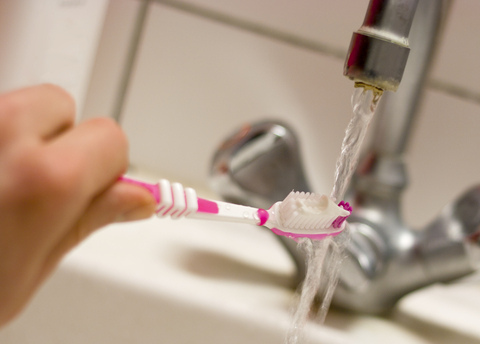November 17th, 2021

Your infant’s first teeth will begin to appear around six to 12 months of age. You might wonder how important these primary teeth really are. After all, baby teeth are destined to fall out within a few years and be replaced by a full set of permanent teeth. However, baby teeth have important functions, and proper care can set the stage for excellent oral and overall health.
Promote Better Nutrition
The appearance of your baby’s primary teeth around six to 12 months of age coincides with changes in your infant’s nutritional needs. Beginning at six months, exclusive breastfeeding is no longer nutritionally sufficient; this is the age at which you should introduce solid foods.
At six to eight months, when your baby can start to chew, strained or pureed fruits and vegetables are appropriate. As your little one’s teeth grow in and chewing abilities progress through 12 months of age, you can gradually add cereal, bread, cooked meats, and other adult foods to his or her nutritious diet.
Increase the Life Expectancy of Baby Teeth
Although baby teeth are inevitably going to fall out and be replaced by permanent ones, making baby teeth last serves an important role that can have benefits into the future. Baby teeth serve as placeholders for permanent teeth. If they decay and fall out too soon, permanent teeth are more likely to grow in crooked.
How to Take Care of Baby Teeth
Your baby’s primary teeth are already in his or her mouth at birth; they are just invisible because they have not broken through the gums. Since they are already present, your baby can get cavities if you do not practice proper oral hygiene from the beginning.
- Do not let your baby fall asleep with a bottle in his or her mouth.
- Brush your child’s baby teeth twice a day as soon as they come in.
- Floss your child’s teeth as soon as he or she has two teeth that touch.
- Visit Robert Scott Meuselbach DDS for your baby’s first checkup when the first tooth arrives.
November 10th, 2021

Because babies’ teeth don’t appear until around six to eight months of age, it’s a natural misconception that they don’t need dental care. But the steps you take as the parent of an infant can help your baby maintain good oral health and develop healthy dental habits in the future.
It’s easy to take care of a baby’s teeth and gums, especially when oral hygiene for your infant becomes part of the normal daily routine. Learn more about how you can promote good dental health for your baby with these tips and considerations.
Taking Care of Baby’s Oral Hygiene
- Dental Hygiene for Birth to Six Months. Cleaning your infant’s gums is as important as cleaning teeth will be later. Hold your baby in your arms, and with a clean, moistened washcloth wrapped around your index finger, gently massage his or her gums.
- Dental Hygiene for Six to 12 Months. After teeth begin to appear, it’s time to switch to a soft, children’s toothbrush for teeth cleaning. New research has shown that fluoride toothpaste is safe and recommended for use once your baby’s first tooth arrives. Gently brush your baby’s teeth after each feeding, in the morning, and before bedtime, just as you did before teeth appeared.
- Good Bedtime Habits. One of the most important things you can do to protect your infant from tooth decay is to avoid the habit of putting baby to bed with a bottle. Use other soothing bedtime activities, such as rocking and lullabies, to help your baby drift off to sleep.
- A Note about Dental Decay. Many people are unaware that dental decay is transmissible. Avoid placing your baby’s bottle, sippy cup, or pacifier in your own mouth to test the temperature. Likewise, don’t share utensils with your baby.
Partner With Your Dentist
Your baby should receive his or her first dental health checkup by the age of six months. Even though your infant may not have teeth yet, Dr. Meuselbach can assess the risk your baby might face for oral diseases that affect hard or soft tissues. Dr. Meuselbach can also provide you with instructions for infant oral hygiene, and explain what steps to add as your baby grows and develops.
Robert Scott Meuselbach DDS is your partner for good oral health, and we’re here to make caring for your baby’s dental hygiene and health easier and more enjoyable for you.
October 27th, 2021

When it comes to keeping your smile looking its best, good oral hygiene is a must! Good oral health habits should start early and continue throughout your lifetime. Here, Dr. Meuselbach and our team at Robert Scott Meuselbach DDS suggest five habits worth adopting that will help keep your teeth healthy:
- Brush and floss regularly. Brush gently at least twice a day, paying special attention to the gum line to rid your mouth of food and bacteria that may lurk in between your teeth. Floss at least once a day. Replace your toothbrush every three to four months or sooner if the bristles are frayed.
- Make regular visits to see Dr. Meuselbach. Regular checkups (twice yearly) will help diagnose any dental problems early on when they can be more easily treated.
- Stop smoking. Did you know smokers are four times as likely as nonsmokers to develop periodontal (gum) disease? Tobacco, whether in the form of cigarettes, pipes, cigars, or chewable tobacco, increases oral and throat cancer risks, and raises the risk for candidiasis, an oral fungal infection. Smokeless tobacco contains sugar, which furthers your risk for cavities.
- Limit your alcohol intake. Heavy drinking dramatically increases the risk of developing mouth and throat cancers.
- Eat healthy. Avoid snacking on foods that contain high levels of sugar or starch. We encourage you to eat plenty of fruits and vegetables, which are known to help stimulate the flow of saliva to re-mineralize tooth surfaces and neutralize cavity-causing bacteria.
To learn more about the habits you should practice in between your visits to Robert Scott Meuselbach DDS, or to schedule an appointment, please give us a call today!
October 20th, 2021

You may have heard talk about the germs that can reside on your toothbrush and thought, “really?”
It’s true—there are several kinds of bacteria that can lurk on the bristles of your toothbrush, including streptococci, staphylococci, Herpes Simplex I, and the Influenza virus. To protect your toothbrush from bacteria, Dr. Meuselbach and our team want you to consider the following three tips:
- Wash your hands before and after brushing.
- Allow the brush to air dry after each use, as harmful bacteria dies after being exposed to oxygen. It is best to disinfect your toothbrush weekly and allow it to dry in between use. Store the toothbrush in an upright position to allow water to drain and dry faster
- Replace your toothbrush every three to four months, or after being ill. Worn bristles are less effective in properly cleaning your teeth, and can actually be damaging to teeth if used too long!
We hope these tips help! Feel free to give us a call at our West Chester office or ask us on Facebook if you have any questions!




